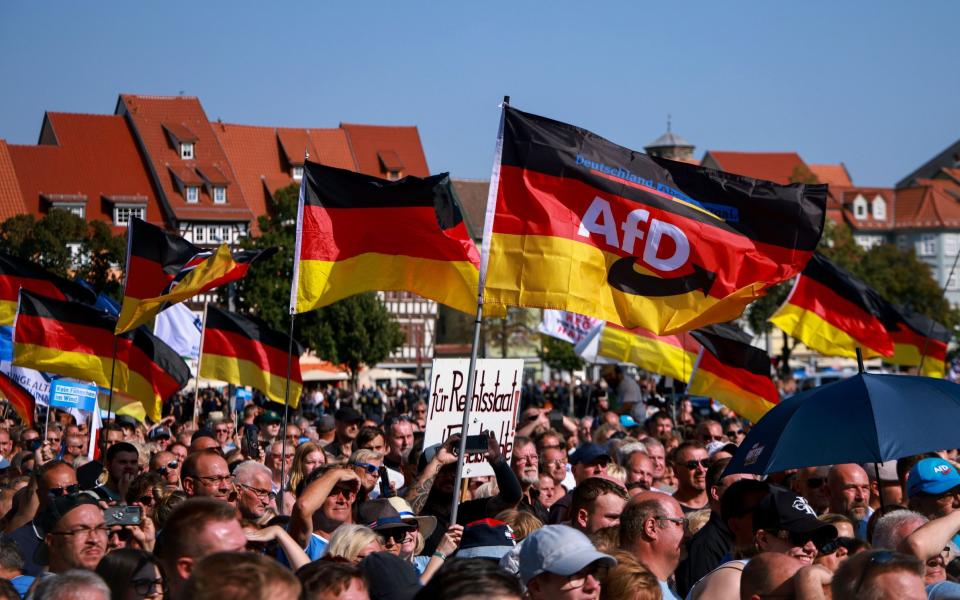
The initially reactionary success in German state political elections as a result of the Second World War was known as a “bitter” impression by Chancellor Olaf Scholz and has really been taken as an indicator of climbing anti-immigration sensations all through the nation.
Yet the origins of the Alternative for Germany (AfD) victory in Thuringia on Sunday are as a lot monetary as they’re political.
AfD, whose branches in each Saxony and Thuringia are beneath predominant monitoring as “proven right-wing extremists”, has really constructed its powerbase within the japanese, which up till 1990 was a unique nation. Residents of the world– which covers important cities corresponding to Leipzig and Dresden– have for years actually felt permit behind financially, despite substantial initiatives to “level up”.
“People really think they are worse off relative to people in other regions, [which] correlates strongly with AfD votes,” states Jens Südekum on the Düsseldorf Institute for Competition Economics (DICE).
“All the big German corporations are pretty much all in the west. And who sits on the board of them? Also all people from the west. Many east Germans tend to consider themselves as second class citizens 30 years after reunification, because there’s still this under-representation across business, sports, arts and even music.”
Trillions of euros over 3 years have really fallen quick to tighten the divide in between japanese and west Germany.
The typical household within the west gained EUR8,000 (₤ 6,738) a 12 months much more gross than one within the japanese in 2021, in response to Germany’s reserve financial institution.
There is a considerable riches void as effectively: the everyday west German household had EUR127,900 of possessions, contrasted to easily EUR43,400 within the japanese. A federal authorities document late in 2014 claimed riches variations nonetheless developed the “most significant differences” in between each areas.
This is despite initiatives to close the void, with larger than EUR2 trillion invested in reunification as a result of the Nineties.


Support stays to immediately: the German federal authorities late in 2014 revealed round EUR10bn in aids for an Intel chip manufacturing facility in Magdeburg on the Elbe river. Brussels moreover okayed to EUR5bn in state assist for a brand-new semiconductor manufacturing middle in Dresden, led by Taiwan Semiconductor Manufacturing Company (TSMC).
Yet numerous within the japanese nonetheless actually really feel forsaken. An scholastic analysis in 2014 found japanese Germans proceed to be underrepresented prepared of administration, with a lot lower than one in 8 that inhabit aged duties coming from the earlierGerman Democratic Republic This though that japanese Germans characterize a couple of fifth of the overall populace.
Approximately 90pc of Germany’s authorized representatives, 80pc of its researchers and 70pc of the media come from the west, in response to the Resolution Foundation.
Südekum, that recommends the German federal authorities, matured on the western aspect a few miles from the outdated boundary. In some strategies, each areas are nonetheless globes aside, he states.
“Urban people like me from west Germany and rural people in east Germany live in two different worlds that hardly have any contact with each other. That’s part of the problem.”
An equivalence document looking at residing standards all through the nation launched by policymakers this summertime revealed that these residing in japanese Germany mored than glad but thought people somewhere else have been much better off.
This chip on their shoulder assists to explain the allure of AfD. The occasion campaigned on the message that Berlin– itself deep inside japanese Germany, although separated up till reunification– was falling quick man within the streets.


Christian Schulz, principal European financial knowledgeable at Citi, states help for democratic occasions just like the AfD has really been “ratcheting up” for larger than a years and has really generally accompanied monetary chaos.
“In 2013 it was the euro disaster [and] German households felt they needed to pay for the failings of governments in southern Europe. When that pale, assist for the AfD pale too.
“Then the refugee crisis hit, which is a mix of economic and social issues, and that boosted the AfD into the 2017 elections. And then the pandemic gave them another boost, because they were the only party resisting lockdowns and so on.”
Schulz thinks this has inevitably moreover introduced concerning the surge of other populist parties in Germany including the BSW led bySahra Wagenknecht Ms Wagenknecht has really moreover delighted in success along with her model title of social preservation and financially leftist plans.
“She’s saying that the traditional left are losing because they’re too much focused on what these metropolitan elites care about: the environment, equality of women and men, and equality of foreigners and non-foreigners and not enough on improving the material situation of workers and poorer parts of society.”


Today, Germany is as soon as extra confronted with a recession. The nation got here beneath financial disaster in 2014 after the lack of reasonably priced Russian fuel adhering to the battle in Ukraine hammered Germany’s main business trade. Its economy remains weak.
In the japanese, troubles are worsened by lasting populace lower.
“The potential of east Germany’s economy is eroding because there are more deaths than births and there’s not enough immigration to offset it,” states Schulz.
Between 1989 and 2019 Germany’s populace dropped by 3m. More migration will surely assist to extend growth but AfD ballots advocate the response versus it’s simply increasing.
What are the companies?
“Just swamping east Germany with more money obviously doesn’t work,” Südekum states. “Levelling up social spending, increasing the minimum wage. We’ve tried that for decades, and politically it hasn’t worked.”
He thinks much more devolution is the answer: “I would start with local infrastructure projects and give communities in east Germany enough fiscal capacity so that they can build what they want so it’s not Berlin deciding what’s good for the people in rural east Germany.”
For presently, the reverse is happening. Mainstream German political occasions are getting ready to impede AfD from energy.
AfD’s Bj örn Höcke, that has really been based responsible of using a Nazi motto, knowledgeable a German broadcaster on Sunday: “Please stop stigmatising me. We are the number one party in Thuringia. You don’t want to classify one-third of the voters in Thuringia as right-wing extremist.”
Schultz states: “Experience suggests ignoring them will just boost them. [Support] seems to be ratcheting up with every crisis.”
Worryingly for Olaf Scholz, the dilemmas simply seem like acquiring much more fixed.



